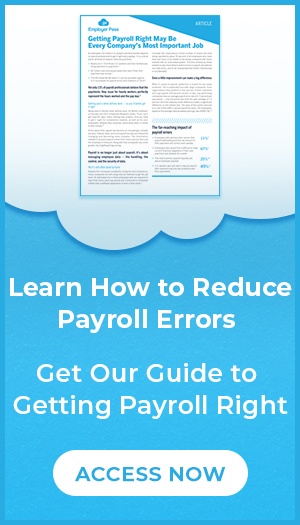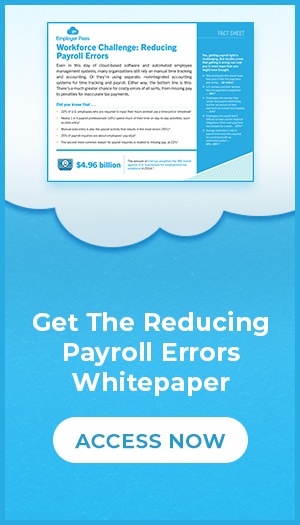by Employer Pass, on Mar 4, 2021 2:52:08 PM
No matter what size your business is, making sure that your payroll processes and payroll software is configured to comply with every applicable payroll and labor law can be challenging. Payroll compliance errors and mistakes can attract costly penalties from organizations like the Department of Labor (DOL).
Wage and payroll issues and non-compliance tend to be one of the most common areas of legal claims made against employers.
In fact, the Wage and Hour Division (WHD) of the U.S. Department of Labor received about 9,000 calls per day in 2020. Combined with other methods employees use to file a report, this equated to more than 16,000 cases in 2020 for minimum wage and overtime violations. This was actually a decrease of about 4,000 cases from the annual average (presumably as a result of the pandemic and COVID-19).
Outsourcing payroll to a professional payroll services company is one good solution to the problem of payroll mistakes and non-compliance, but what kinds of payroll errors would outsourcing help you avoid?
Here are some examples of payroll compliance issues to look out for:
Classifying Employee Status and Type Incorrectly
Under the Fair Labor Standards Act (FLSA), employers need to assign the right classification or FLSA status to the people that work for them - as a non-exempt or exempt employee or as a contractor.
The rules for FLSA status tend to be defined in somewhat ambiguous ways, leaving the process open to interpretation, which makes misclassifications fairly common. Once understanding the FLSA status and classification, there are also employee types and contractor types that should be assigned:
- Employee Types can include full-time, part-time, temporary, or seasonal employees
vs.
- Contractor Types or contingent worker types, which can include freelancers or consultants
Employers are able to use Form SS-8 to ask the Internal Revenue Service (IRS) about clarifications with employee or contractor classification. Labor-intensive as it can be, seeking clarifications for each employee is a foolproof way to be on the right side of the law. Many employers, however, tend to take shortcuts, and end up misclassifying their workers, and paying penalties as a result.
Why do employees need to be properly categorized? Each of these employee statuses for FLSA or employee types can warrant different pay rules, pay rates or payroll tax rates, which leads to our next mistake...
Not Accurately Paying Employees or Calculating Payroll

Should the labor commissioner for your state conduct an audit and find payroll inconsistencies that violate minimum wage, or any FLSA or wage regulations, the potential penalties could run into the hundreds of thousands dollars. In addition, correcting these issues or mistakes in the form of paying "back wages" to employees could add to those costs.
In California alone, the California Labor Commissioner's Office noted that the Department of Labor reported minimum wage laws were violated in the state 372,000 times each week.
State minimum wage laws - and even city or region minimum wage laws - are constantly changing, so it's important to keep up on the laws for the states where employees are employed.
Getting a good time and attendance software in place can also help with tracking employee time worked, accurately calculating employee pay rates (across regular time, overtime, or time off / absence), and feeding this data into payroll for an error-free paycheck.
Not Properly Maintaining Employee Records
Unintentional non-compliance with the payroll basics is common in payroll operations in large part because of the large number of records that HR and payroll departments need to create, manage, and keep. These various types of records, ranging from employee records to workers' compensation, need to be archived for years -- usually between three and seven years.
Payroll processing and maintaining compliance can be a lot of work for any employer, especially considering the fact that rules and various types of labor laws change on an annual basis. Recordkeeping requirements can lead to unwieldy filing and compliance burdens, so missing records can be fairly common, and can lead to fines or penalties.
Outsourcing payroll to help with standard payroll processes and keeping every record straight is one way to ensure that mistakes are avoided.
Making Direct Payments to Employees Outside of Payroll
Payments businesses make to their employees, no matter what form they may take, are typically taxable. The IRS makes it mandatory for employers to withhold payroll taxes from payments made to employees.
Making direct payments to employees, however, tends to be a common payroll mistake that companies make and can prove costly to fix if discovered. A few examples of direct payments categories can include:
- Bonuses
- Commission
- Gift card
- Physical gifts
This type of direct pay is pretty commonly paid by employers. However, each of these categories are taxable payments and should be subject to payroll tax deductions.
A general process to avoid this is ensuring any payments to employees are made through your payroll software, payroll department, or payroll company. They will help identify any IRS rules and any exceptions to the rules. Exceptions being something like employee expense reimbursements (if managed through an accountable plan).
Missing Reporting Deadlines and Late Payroll Tax Filing
Missing these reporting deadlines or filing payroll taxes late can be a common occurrence and will definitely result in fees and penalties:
New Hire Reporting
The Personal Responsibility and Work Opportunity Reconciliation Act (PRWORA) of 1996 made it mandatory for employers to inform the appropriate state agency of all new hires that have been made within 20 business days of the date of hire. State agencies report new hire information to the National Directory of New Hires.
Quarterly Payroll Tax Filing
Form 941 - each quarter, an employer must file Form 941 with the IRS to report withholdings from employees paychecks for income taxes, Social Security tax, and Medicare tax. Learn more about Form 941 instructions here.
W-2 - the IRS requires employers to send employees a W-2 at the close of each tax year, typically no later than January 31st. This is because employees need to use any W-2s they receive to file their federal and state taxes.
1099 - the IRS also requires employers to send form 1099-MISC to contractors at the close of each tax year, typically no later than January 31st. The 1099 forms, however, are only required for contractors that are paid $600 or more during the year. The 1099 form and requirement for employee classification is why it's to uncommon to hear people refer to contractors referred to as "1099s".
1096 - if an employer files 1099 forms, to do their taxes, they must also use a 1096 form when filing traditional paper taxes, which acts as a cover sheet or summary for the IRS regarding the 1099 forms that follow.
Form 941 and any W-2s should both typically be populated, filed, and delivered by your payroll software or payroll company. While the 1099 and 1096 forms are typically managed by an accountant or accounting firm.
To avoid risk of non-compliance and to minimize the occurrence of payroll mistakes, outsourcing payroll to an third-party payroll provider can be a great option. Great payroll companies keep up with changing legislation and help ensure accuracy and compliance in almost every way from new hire reporting all the way to year-end processes.
Passing payroll responsibilities to a payroll company can be the most efficient and cost-effective way for employers to simplify payroll and ensure the "perfect" paycheck for employees.
Best of all?
Outsourcing back office functions like payroll and payroll tax filing allow employers to get back to focusing on the business of their business.




